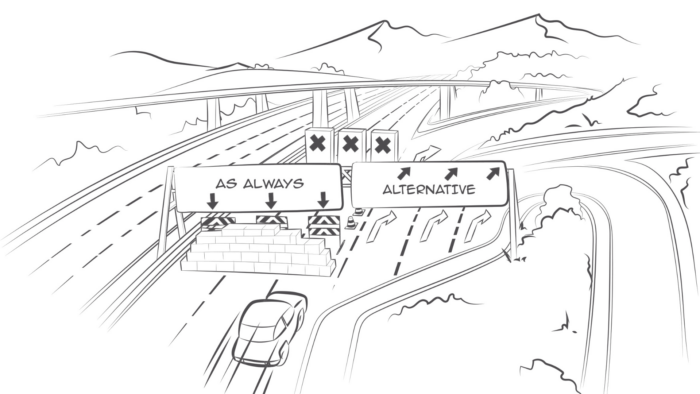Stress means being stuck in patterns
Thomas*, a coaching client, is the CEO of a mid-size company that he has successfully led for over a decade now. Under his guidance new products have been developed, new markets have been tapped in to, and the organizational structure has continuously been optimized leading to continuous and steady growth of the business.
But Thomas is living two lives. The business life, in which all seems in control, and a private life, in which he is in a constant battle to survive and nonstop losing energy. Slowly his private exhaustion transfers also to his business world. He admits that now and then he first must take a drink before he goes home to his wife and three children. At night he uses more often medicine to have a quiet and acceptable rest.
Suffering from stress over a longer period affects your immediate productivity and even can lead long-term health issues, even though you might not realize it. And it doesn't matter whether the source of your stress lies in your private or in your business live. It can even have more severe consequences as Knowledge at Wharton write in their article about How Stress affects CEO Aging and Mortality.
Alcohol is not the solution. It just makes you forget the problem
Christopher Ferry
Using alcohol or medicine to reduce stress might seem an easy and effective remedy. Although some might believe that alcohol in small doses can help reduce stress, on the long term it may be counterproductive and eventually turn harmful (What Alcohol Does to a Stressed-Out Brain).
Alcohol or medicine blends for a moment our symptoms at the surface but does not solve our real causes. It is like ignoring the fuel warning light flashing in the dashboard of a car by covering it with tape. The fuel however will eventually run out, also if we don't want to see it.

The reason for such symptomatic behavioural lies at our patterns we unconsciously created in our childhood or teenage years. Routines were built to avoid pain and unpleasant feelings. And as we practiced them repeatedly, they have become patterns that now are not useful anymore.
All fixed set patterns are not incapable of adaptability. The truth is outside of all fixed patterns.
Bruce Lee
So was the case for Thomas. Through an imaginary exercise tapping into his unconsciousness, he became aware of certain childhood situations he had long forgotten but stored strong emotions. Retrieving these repressed feelings enabled to relieve the inner tension and to embrace his vulnerability.
His increased self-awareness and his growing ability to perceive when he was falling back into his devoted pattern of serving others enabled him to step out, and to take on and practise other roles.
Breaking out of our patterns can be stimulated by different means.
- Having frequently breaks. This is not only important to maintain our energy level, it also allows us a moment of reflection regarding the role we are currently identified with and empowers us to change this. Even incredibly busy people can cultivate periods of sustained quiet time as smalls breaks of 2 to 5 min would already be effective to reflect and to deliberately choose a next role.
- Integrating periods of quiet time during the day. Recent studies are showing that taking time for silence or even taking naps at work restores our nervous system, helps sustain energy, and conditions our minds to be more adaptive and responsive to the complex environments in which so many of us now live, work, and lead (The busier you are the more you need quiet time).
- If we want to grow beyond our patterns, we must create a deeper understanding what the causes of our patterns are. Only then we can deliberately try out new ways, practise new styles and expand our range of behavioural options. This process starts by becoming aware of these specific roles we continuously yet unconsciously take on. From here we can continue to understand the sources of these patterns, why we created them and what they try to protect us from. This will improve our ability to consider different responses and increase our emotional intelligence (Why Some People Get Burned Out and Others Don’t).
Six months after Thomas started his process, he noticed sustainable results. On a regular basis and at fixed slots in his calendar he was taking time for himself, he felt more appreciated, and he had more energy. At home he was able to better communicate and stand up for his own needs and most of the time he could now sleep without medicine.
Each of us have experienced certain painful situations or had unpleasant experiences in our early days, even if we had a good childhood or cannot remember a particular occasion or difficult situation. It is entirely a human response, that we forget and push these experiences away into our subconsciousness, maybe out of focus but unfortunately not out of being a powerful influencing factor.

Stress means being stuck in patterns and therefore not being able to deal with the situation. Patterns were created because of psychological injuries, and the stronger they are the more painful were our experiences.
However, our wounds are the keys to the doors of our personal development pathways. By unlocking them, we can develop our dormant potential, become more authentic and grow towards what we really are.
* name has changed